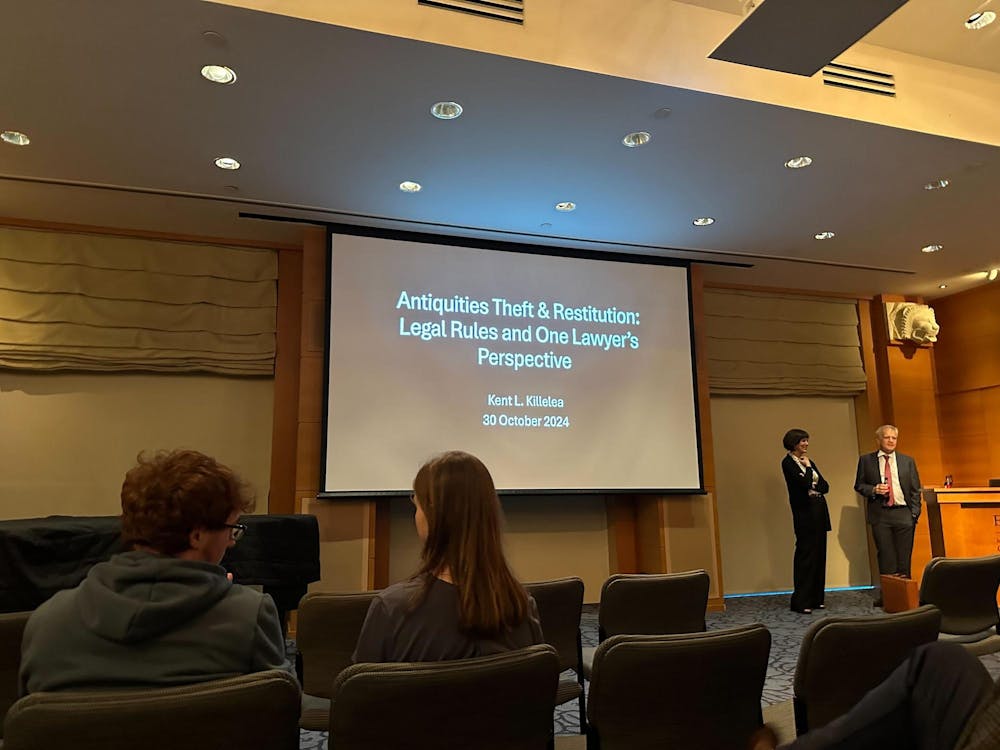Earlier this year, Emory University’s Michael C. Carlos Museum returned three looted artifacts to Greece. In a continuing effort to bring cultural artifacts back to their homes, the art history department hosted an event titled “Antiquities Theft and Restitution: Legal Rules and One Lawyer’s Perspective” on Oct. 30, which showcased legal perspectives and history surrounding the repatriation of art.
Kent Killelea, a partner and of counsel of the law firm Jones Day, gave the keynote address. Killelea, whose practice involves museum and tax law, began the discussion on the history and policy around restitution and followed with his own perspective on the matter.
Killelea identified 1970 as the “magic date,” meaning a turning point in the history and policy surrounding the restitution of cultural artifacts. At the 1970 UNESCO Convention on the Means of Prohibiting and Preventing the Illicit Import, Export and Transfer of Ownership of Cultural Property, 14 countries (141 today), including the United States, agreed to outlaw the illicit import and export of cultural artifacts.
Then in 1983, the United States passed the Convention on Cultural Property Implementation Act, which allowed the country to have more control over the illegal trade of cultural artifacts from other countries, according to Killelea. However, Killelea said strict adherence to the law rolled back in 2003 during the U.S. invasion of Iraq, with approximately 15,000 artifacts looted since then. Even so, Killelea estimated over 10,000 artifacts have been restituted. Killelea also said that since the ’70s, the attitude toward repatriation among museums has become less defensive.
The Carlos Museum had originally acquired the three artifacts that were repatriated to Greece in the early 2000s. The museum also returned five artifacts to Italy in 2023 that had been acquired between the ’80s and early 2000s.
Art History Teaching Professor and Director of Undergraduate Studies Linda Merrill found the way Killelea explored legal perspectives in a space often dominated by ethics compelling.
“It was interesting to hear how a lawyer looks at these issues of repatriation very differently in terms of objects moving through space,” Merrill said. “It was very interesting to think about it in those terms rather than the moral and ethical terms that we usually discuss.”
The Carlos Museum abides by the Guidelines on the Acquisition of Archaeological Material and Ancient Art established by the Association of Art Museum Directors and collects artifacts through “gifts, bequests, and purchases.”
However, the Carlos Museum has struggled to evaluate and potentially repatriate pieces from Mesoamerica due to the region not having a curator until this year, according to Associate Registrar and Provenance Researcher Annie Shanley (15G).
Associate Professor of Art History Megan O’Neil expressed her delight in seeing the Carlos Museum honor the demands of the countries of the artifacts’ origin.
“It’s excellent and important that Emory is responding to requests from countries of origin, as well as doing their own research to figure out histories of objects,” O’Neil said.
O’Neil will be offering a freshman seminar in spring 2025 called “Art History: Whose Art Is It Anyway?” The course will focus on the history of acquiring artifacts from the Americas, especially Indigenous groups, and changes in ethics as they relate to repatriation and property law.
“I want students to think more about the agency of Indigenous people and how we think about laws that were made,” O’Neil said. “I’m excited about teaching it.”
Killelea concluded the talk by discussing his own moral dilemmas in handling these cases. He said that while repatriation is often viewed as a positive or rejoiceful movement, many legal challenges persist in bringing cultural artifacts back home.
“As a lawyer, I have seen things go back or be asked for where there was certainly no guarantee that these things would be cared for,” Killelea said. “I feel very bad about working on these transactions because when you get old enough, you think of yourself as as much a lawyer for these objects as for the museums.”

Jacob Muscolino (he/him) (28C) is a News Editor at The Emory Wheel. He is from Long Island and plans to major in History and Psychology. Outside of the Wheel, he is involved in Emory Reads and Emory Economics Review. You can often find Jacob watching the newest blockbuster for his Letterboxd, dissecting The New York Times and traveling to the next destination on his bucket list.






